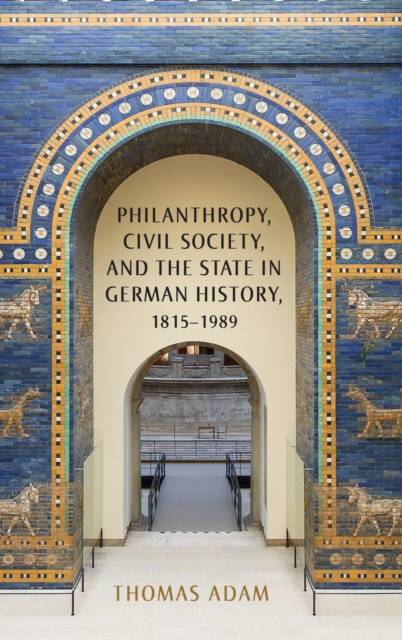
- Retrait gratuit dans votre magasin Club
- 7.000.000 titres dans notre catalogue
- Payer en toute sécurité
- Toujours un magasin près de chez vous
- Retrait gratuit dans votre magasin Club
- 7.000.0000 titres dans notre catalogue
- Payer en toute sécurité
- Toujours un magasin près de chez vous
Philanthropy, Civil Society, and the State in German History, 1815-1989
Thomas Adam
177,45 €
+ 354 points
Description
The first book to provide the English-speaking reader with the revisionist interpretation of the role of the state and philanthropy in Germany that is increasingly embraced by German historians.
Largely unnoticed among English-speaking scholars of German history, a major shift in interpretation of German history has been underway during the past three decades among German historians of Germany. While American and British historians continue to subscribe to an interpretation of German society as state centered, their German counterparts have begun to embrace an interpretation in which nineteenth- and twentieth-century German society was characterized by private initiative and a vibrant civil society. Public institutions such as museums, high schools, universities, hospitals, and charities relied heavily on the support of wealthy donors. State funding for universitiesand high schools, for instance, accounted only for a fragment of the operating costs of those institutions, while private endowments running into the millions of marks funded scholarships as well as health care for teachers and students. Private support for public institutions was essential for their existence and survival: it was the backbone of Germany's civil society. This book is the first to provide the English-speaking reader with this revisionist interpretation of the role of the state and philanthropy in nineteenth- and twentieth-century Germany: a society in which private actors claimed responsibility for the common good and used philanthropic engagement to shape societyaccording to their visions. . Thomas Adam is Professor of History at the University of Texas at Arlington. He has published extensively in the field of transnational history and the history of philanthropy.
Largely unnoticed among English-speaking scholars of German history, a major shift in interpretation of German history has been underway during the past three decades among German historians of Germany. While American and British historians continue to subscribe to an interpretation of German society as state centered, their German counterparts have begun to embrace an interpretation in which nineteenth- and twentieth-century German society was characterized by private initiative and a vibrant civil society. Public institutions such as museums, high schools, universities, hospitals, and charities relied heavily on the support of wealthy donors. State funding for universitiesand high schools, for instance, accounted only for a fragment of the operating costs of those institutions, while private endowments running into the millions of marks funded scholarships as well as health care for teachers and students. Private support for public institutions was essential for their existence and survival: it was the backbone of Germany's civil society. This book is the first to provide the English-speaking reader with this revisionist interpretation of the role of the state and philanthropy in nineteenth- and twentieth-century Germany: a society in which private actors claimed responsibility for the common good and used philanthropic engagement to shape societyaccording to their visions. . Thomas Adam is Professor of History at the University of Texas at Arlington. He has published extensively in the field of transnational history and the history of philanthropy.
Spécifications
Parties prenantes
- Auteur(s) :
- Editeur:
Contenu
- Nombre de pages :
- 234
- Langue:
- Anglais
- Collection :
- Tome:
- n° 5
Caractéristiques
- EAN:
- 9781571139214
- Date de parution :
- 15-06-16
- Format:
- Livre relié
- Format numérique:
- Genaaid
- Dimensions :
- 157 mm x 234 mm
- Poids :
- 521 g

Les avis
Nous publions uniquement les avis qui respectent les conditions requises. Consultez nos conditions pour les avis.






